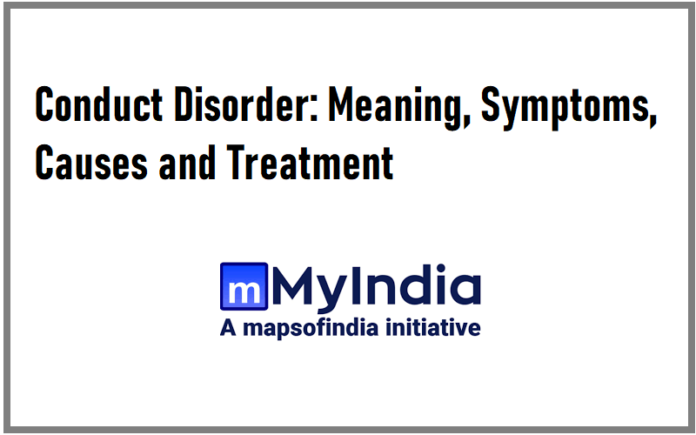Conduct disorder refers to the type of disorder in which individual experiences severe behavioural or emotional issues and young children and teenagers usually face it. Children with this disorder typically display patterns of behaviour, which are socially unacceptable and struggle to follow the rules.
Conduct disorder is different from occasional negative behaviour, and it is considered a disorder when it is there for a long time. Teens also demonstrate negative behaviour such as aggression or disrespect towards others.
Conduct disorder is categorized into three different types based on age groups: Childhood-onset, Adolescent onset, and Unspecified onset.
Childhood-onset refers to having symptoms of the disorder before the age of 10. Adolescent onset refers to having symptoms of the disorder during an individual’s teenage years. Finally, unspecified onset refers to when the age is not unknown during which the disorder had occurred.
What are the symptoms of Conduct Disorder?
The symptoms of conduct disorder vary from person to person, their age, and the severity of the disorder. However, the symptoms are categorized into four different groups for a better understanding of the disorder:
- Aggressive behaviour: It means harmful behaviour to others, such as bullying, fighting, or sexual abuse.
- Destructive behaviour: Causing intentional harm to properties, such as vandalism.
- Deceitful behaviour: This type of behaviour includes repeatedly lying, theft, breaking into someone’s house or car, or even shoplifting.
- Violation of rules: Behaviors displayed by an individual are often considered unethical, such as running away or skipping school, drugs, or substance abuse.
How to understand the severity of Conduct Disorder?
Mild symptoms- There is minimal or no such behaviour that may be concerning.
Moderate symptoms- A child displays some behavioural issues which are impactful towards others as well.
Severe symptoms- The child portrays extremely problematic behaviours which require diagnosis and immediate treatment.
What causes the Conduct Disorder?
There is no specific cause known which causes conduct disorder. However, it can be caused by several factors, such as genetic factors, environmental, biological or psychological factors.
- Genetic: Many individuals with conduct disorder may have family members of other disorders like mood disorders or anxiety disorders. This increases the chance of the child having conduct disorder.
- Environmental: The environment in which a child lives can lead to conduct disorder if they are around a dysfunctional family, experienced child abuse, or even any family member who is a victim of drug or substance abuse.
- Biological: Complications or injuries in the brain can also cause conduct disorder. The frontal lobe of the brain is mainly responsible for an individual’s cognitive skills.
- Psychological: Many children have other mental disorders as well, such as ADHD or anxiety disorders.
Treatment for the Conduct Disorder
The type and duration of treatment for Conduct disorder depend on the child’s age and the severity of the disorder. However, the treatment mainly comprises Psychotherapy and Medication. Psychotherapy is a form of talk therapy in which the counsellor or expert helps the child identify the cues that trigger their irrational behaviour and strategize ways to manage them. There is no such medication to treat conduct disorder, but some medicines can be given to ease the disorder’s symptoms.




